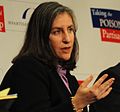Hillaryland was the self-designated name of a group of core advisors to Hillary Clinton, when she was First Lady of the United States and again when, as United States Senator, she was one of the Democratic Party candidates for president in the 2008 U.S. election.
The group included Huma Abedin, Patti Solis Doyle (credited with coining the name "Hillaryland"), Mandy Grunwald, Neel Lattimore, Ann Lewis, Evelyn Lieberman, Tamera Luzzatto, Capricia Marshall, Cheryl Mills, Minyon Moore, Lissa Muscatine, Neera Tanden, Melanne Verveer, Lisa Caputo, Ann Stock and Maggie Williams. In her autobiography, Living History, Clinton credits campaign aide Steve Rabinowitz with first using the term.
Almost all are women; the only man in the group was former First Lady deputy press secretary Neel Lattimore. Most worked in the Clinton Administration, and have been personal friends and confidants of Hillary Clinton since at least then, if not earlier. The name Hillaryland dates back to the Bill Clinton's 1992 presidential campaign, when it was the portion of his Little Rock, Arkansas "war room" that housed Hillary Clinton's staff. Later it became better known as the moniker for the area of the West Wing of the White House in which the First Lady's staff had their offices; according to Clinton, Hillaryland had its own subculture, based on camaraderie, never leaking information to the press, and having plenty of toys and cookies around for the children of staffers – as Hillary put it, "While the West Wing had a tendency to leak... Hillaryland never did, and every child who ever visited knew exactly where we stashed the cookies." Clinton biographers Jeff Gerth and Don Van Natta, Jr. described Hillaryland as "an important subculture during the Clinton presidency."
The advisers were also present during Clinton's tenure as U.S. Senator. But the role of Hillaryland came under considerable discussion during and after Clinton's 2008 presidential campaign that she conducted while senator. Michelle Cottle of New York magazine described its role as "less a campaign entity than an extended sisterhood defined by its devotion to its namesake. Even so, the group's protective ethos dominates her presidential campaign, where loyalty is demanded, self-promotion frowned upon, and talking out of school, especially to the press, ." As campaign chroniclers John Heilemann and Mark Halperin later wrote, "the people comprising it ... were loyal to a fault, smart and ruthless, hard-headed and hardboiled. ... They referred to themselves collectively as Hillaryland, and everyone else in politics did too." By this point the definition of Hillaryland was often expanded a bit to include campaign insiders such as chief strategist Mark Penn.
After she ended up losing the 2008 Democratic nomination, critics often focused on the limited and isolated circle of advisers and dysfunctional management style as one of the reasons behind the campaign's failure. One criticism was that she valued personal loyalty over the ability to do the job. The level of protection and the consequent inability to criticize failed tactics—and the public perception that Clinton needed that much protection—alarmed critics in 2015 as well, prior to her loss in the general election the following year.
At the beginning of Clinton's 2009–13 tenure as U.S. Secretary of State, she brought over some of the Hillaryland personnel to staff the State Department, but she also hired other people as well.
Gallery
-
 Huma Abedin
Huma Abedin
-
 Mandy Grunwald
Mandy Grunwald
-
 Ann Lewis
Ann Lewis
-
 Evelyn S. Lieberman
Evelyn S. Lieberman
-
 Capricia Marshall
Capricia Marshall
-
 Cheryl Mills
Cheryl Mills
-
 Minyon Moore
Minyon Moore
-
 Neera Tanden
Neera Tanden
-
 Melanne Verveer
Melanne Verveer
-
 Lisa Caputo
Lisa Caputo
-
 Ann Stock
Ann Stock
-
 Mark Penn
Mark Penn
See also
References
- Hernandez, Raymond (2006-12-13). "Adviser to Senator Clinton Stays in Shadows". The New York Times. Retrieved 2008-02-10.
- Sherrill, Martha (1993-01-15). "HILLARY CLINTON NAMES TOP STAFFERS". Washington Post. ISSN 0190-8286. Retrieved 2017-12-13.
- Romano, Lois (2007-06-21). "Gatekeepers of Hillaryland". The Washington Post. Retrieved 2007-07-16.
- Clinton, Hillary (2003). Living History. Simon and Schuster. pp. 114–115. ISBN 978-3-430-11862-0.
- ^ Clinton, Hillary Rodham (2003). Living History. New York: Simon & Schuster. pp. 115, 133. ISBN 978-0-7432-2224-2.
- ^ Gerth, Jeff; Van Natta, Don Jr. (2007). Her Way: The Hopes and Ambitions of Hillary Rodham Clinton. New York: Little, Brown and Company. ISBN 978-0-316-01742-8. Chapter 16.
- ^ Cottle, Michelle (August 2007). "Hillary Control". New York. Retrieved 2007-08-08.
- ^ Romano, Lois (2010-03-11). "Hillary Rodham Clinton widens her circle at the State Department". The Washington Post. Retrieved 2015-07-31.
- ^ Heilemann, John; Halperin, Mark (2010). Game Change: Obama and the Clintons, McCain and Palin, and the Race of a Lifetime. New York: HarperCollins. pp. 69–71. ISBN 978-0-06-173363-5.
- Sheehy, Gail (August 2008). "Hillaryland at War". Vanity Fair. Retrieved 2015-07-31.
- Ellison, Sarah (2015-10-07). "How Hillary Clinton's Loyal Confidants Could Cost Her the Election". Vanity Fair. Retrieved 2018-02-18.

